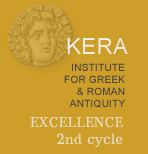Endnotes
[1] Cf. Behrwald [2000], 163 with n. 8; contra Schindler 1972, 19.
[2] İnan, however, misreads Jones (p. 292), who points to the horizontal stroke after the final nu of Ἀντωνεῖνον, and speculates that the inscription may not be complete. If, on the other hand, the inscription is complete, Ἀντωνεῖνον could refer to a number of emperors according to Jones. Jones does not, as İnan's implies, speculate on that horizontal line possibly belonging to an Omega, and Ἀντωνεῖνον therefore being in fact the genitiv plural Ἀντωνείνων (İnan p. 224). Concerning the statue of Commodus, İnan p. 224 writes that it was the largest of all (a torso of 1,40 m without the head), but the torso most likely to have represented Septimius Severus was much larger: a torso of 2,165 m and a head of 0,49 m. See İnan p. 226 ("wahrlich kolossal").
[4] Literally: in the will that he made.
[5] IK Kibyra I 113; 119; 120; 121; 129; 151; 152; 157; 158; 159; 160; 161; 165; 168; 176; 179; 182; 183; 188; 192; 195; 197; 200; 202; 206; 231; 238; 246; 251; 258; 263; 269; 272; 279; 280; 281; 291; 294; 296; 297; 301; 306; 310; 311; 312; 317; 319; 333; 334; 338; 339; 343; 344; 349; 365; 370; 371; 386; 387; 404; 435?
[6] Literally: for their father, that he be remembered.
[7] Literally: for Chrysanthe, the most sweet wife, in memory.
[8] Literally: having [lived] well and died.
[9] Literally: my sweetest home city.
[10] Literally: raised himself (as) a lion; see n. 35.
[11] Literally: for his brother Kallikles, in memory.
[12] Fick (1894), 16, cf. IK Kibyra I, p. 182, n. 175.
[14] Milner 1998, p. 3, n. 2.1: "not re-examined by Hall".
[15] Schindler 1972, p. 24: ungefähr 5,5 km von Bubon entfernt ... an der Grenze zwischen dem Gebiet von Bubon und der Ebene von Dirmil p. 25: [Die Anlage] liegt zwischen zwei mäßigen Erhebungen und unweit von hier sentkt sich die Straße dann in die Ebene von Dirmil... Am ehesten könnte man an eine kleine Befestigung denken.
[16] Or: erect; ἐπιστάνουσιν is present tense of the verb ἐφιστάνω (ἐπι-ἱστάνω without the aspiration).

